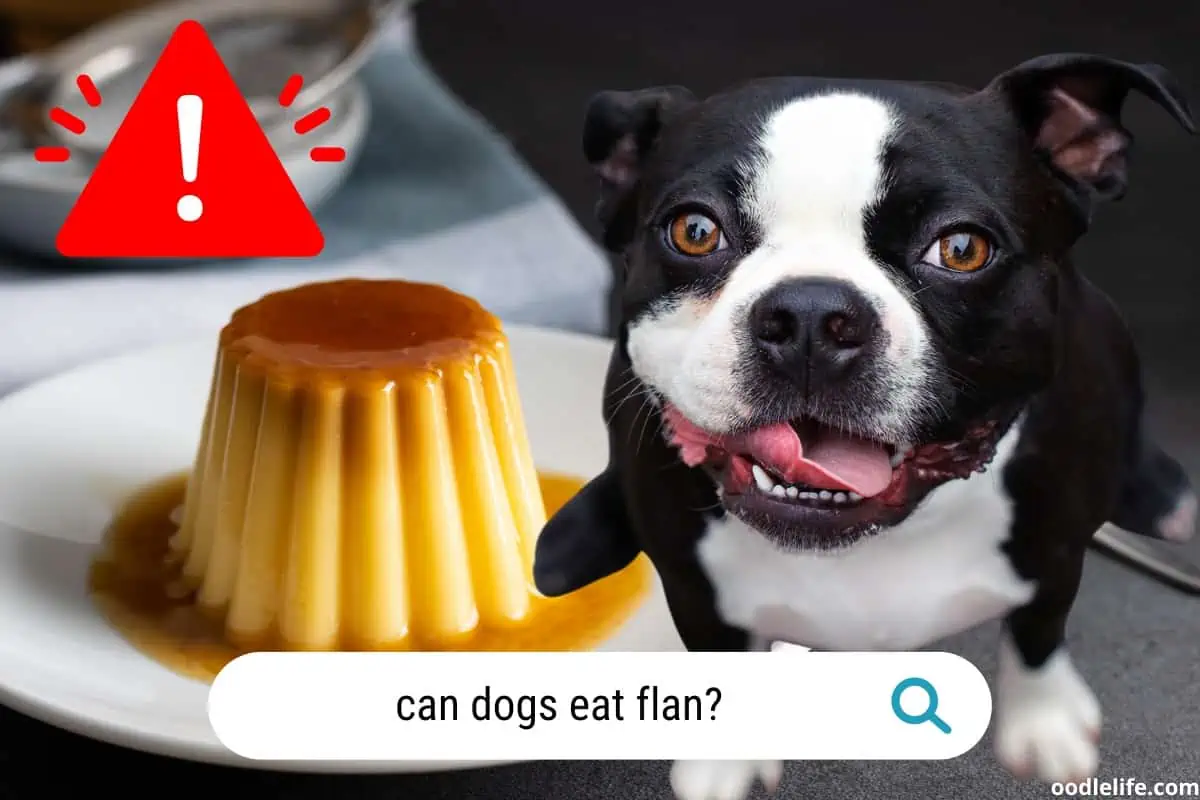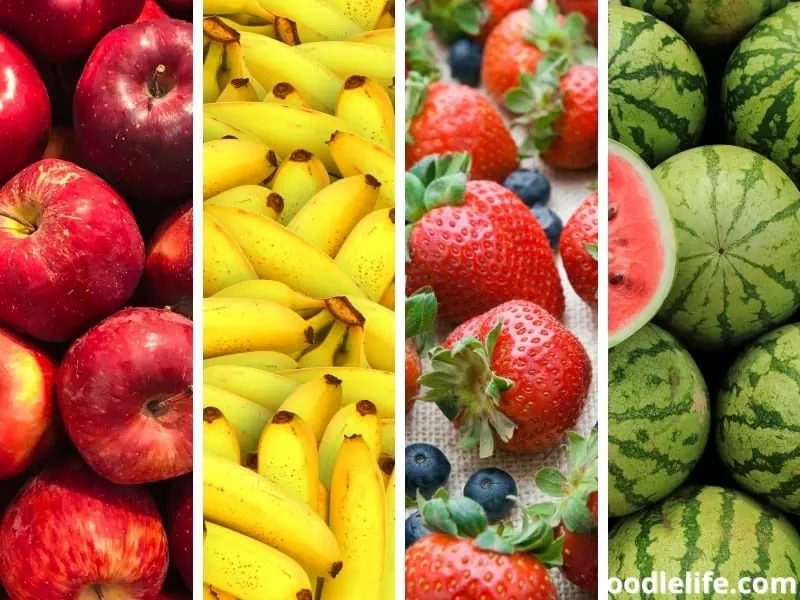Can Dogs Eat Flan? (DANGER Explained)
Love spoiling your dog with tasty treats? Ever wondered if sharing a bite of creamy flan is a good idea? You’re in the right place to find out.
Flan’s sweet and creamy taste might be a hit with humans, but is it safe for your pup? Let’s dig into the ingredients and see what they mean for your dog’s health.
Dogs can eat flan in small amounts occasionally, but its high sugar and dairy content make it an unhealthy choice for regular treats.

What Is Flan?
- Flan is a sweet, creamy dessert loved by humans.
- Key ingredients include sugar, eggs, and dairy.
- High sugar content is unhealthy for dogs.
- Dairy can cause digestive issues in some dogs.
- Small portions occasionally are okay, but not recommended as a regular treat.
Flan is a popular dessert that originates from various cultures, with different variations to the recipes. At its core, flan is a creamy and delicate custard dessert, made with simple ingredients like eggs, sugar, milk, and flavored with vanilla. To elevate this dessert even further, a caramel layer is often added to the bottom of the dish, resulting in a silky, melt-in-your-mouth sensation as you enjoy each spoonful.
Now, you might be wondering about the various types of flan that exist. The traditional version, often referred to as sweet egg custard, is found in many cuisines such as French, Spanish, and Mexican. Another popular variation is the fresh fruit flan, where the custard base gets topped with a colorful assortment of fruits.
This version often includes a layer of sponge cake or pastry crust on the bottom, providing a delightful contrast in texture.
Among the many flan recipes, the leche flan stands out as particularly delicious. Hailing from the Philippines, leche flan is a denser, richer take on the classic custard dessert. It uses condensed and evaporated milk instead of regular milk, resulting in a velvety, indulgent treat. The caramel on top of the leche flan also adds an irresistible, gooey sweetness.
Here’s a quick overview of flan’s key components:
- Custard: A mixture of eggs, sugar, and milk creates the smooth, creamy base.
- Caramel: This sweet syrup gives the flan a deliciously gooey top layer.
- Vanilla: Used to flavor the custard, adding depth and warmth.
- Variations: Fresh fruit flan, leche flan, and caramel custard offer unique takes on the classic dessert.
In conclusion, flan is a versatile and mouthwatering dessert, delighting in its simplicity and charm. The combination of custard, caramel, and various flavors result in a taste experience that will leave you craving just one more bite.

So Can Dogs Eat Flan?
You may be wondering if it’s safe to share a delicious treat like flan with your furry friend. Flan, a custard-like dessert made from eggs, sugar, and milk, might be tempting to give to your dog as a special treat. However, it’s important to know whether it’s a good idea to offer flan to your canine companion.
Firstly, it’s essential to consider the ingredients used in flan. The main component, which is sugar, can be harmful to dogs in large quantities. High sugar consumption might lead to obesity, dental problems, and in some cases, even diabetes in dogs. While an occasional small sweet treat might not be a huge concern, it’s better to avoid making it a habit.
Another ingredient in flan is milk, which could pose a problem for dogs, especially lactose-intolerant ones. Some dogs can have difficulty digesting lactose, leading to gastrointestinal issues like diarrhea, gas, and stomach discomfort. If you’re not sure how your dog reacts to dairy products, it’s safer to steer clear of flan.
Eggs, on the other hand, are generally safe and nutritious for dogs when cooked appropriately. However, the benefits of eggs are overshadowed by the potential harm from sugar and milk in flan.
So, is it safe for dogs to eat flan? While a tiny bite might not cause immediate harm, it’s best to avoid feeding flan to your dogs due to the aforementioned reasons. There are plenty of dog-friendly treats available that are specifically designed for their dietary needs. Next time you’re in the mood for sharing a treat with your pup, consider opting for a healthy dog biscuit or an apple slice instead. That way, you can both enjoy a snack without any worries.
Health Risks of Flan to Dogs
Flan might seem like a tasty and innocent treat to share with your furry friend, but think twice! Feeding your canine companion flan can introduce several health problems. Your beloved pet’s body might not agree with this sweet dessert and could cause digestive issues – lactose intolerant dogs, beware!

You might inadvertently be making your dog susceptible to a range of health problems, including obesity and diabetes, by sharing your dessert. Flan is quite high in sugar, which contributes to tooth decay and weight gain. Just as humans should consume sugar in moderation, it’s crucial to watch your dog’s intake too.
Moreover, dogs that indulge in sweets like flan can experience digestive upset, such as diarrhea, vomiting, and abdominal pain. While the sight of your pet happily licking up a spoonful of flan may be cute, the aftermath is less pleasant.
Besides triggering digestive issues, feeding your dog flan can also increase the risk of pancreatitis. This inflammation of the pancreas is often brought on by a high-fat diet and can lead to abdominal pain, vomiting, and in some cases, even seizures.
To sum things up, as much as you love your dog and want to share everything with them, flan is not a suitable or safe treat. Stick to dog-friendly treats that will not compromise your pet’s health. Keeping your canine companion happy and healthy is far more important than giving in to puppy eyes pleading for a taste of that tempting dessert.
Toxic Ingredients for Dogs in Flan
When it comes to feeding your dog, it’s crucial to be aware of certain toxic ingredients that can be harmful to your furry friend. Here are some common dangerous substances that might find their way into foods like flan.
You might think that giving your dog a little treat, such as flan, is harmless. However, some ingredients commonly found in flan, like artificial sweeteners, can be toxic to dogs. For instance, xylitol, a commonly used sugar substitute, is known to cause a rapid insulin release in dogs, leading to hypoglycemia and potentially fatal consequences. So, it’s important to make sure your dog stays away from foods containing xylitol.
Apart from xylitol, there are other ingredients and food items you should avoid giving to your dog. Grapes and chocolate are well-known toxic foods for dogs. Accidental ingestion of grapes or raisins can cause kidney failure, while chocolate contains theobromine, a powerful stimulant that can be fatal to dogs if consumed in large amounts.
Another group of hazardous ingredients includes allium family vegetables, such as onions, garlic, chives, and leeks. These vegetables contain compounds that can damage a dog’s red blood cells, potentially leading to anemia. While small amounts may not pose a significant threat, it’s best to avoid them as much as possible.
Fruits with seeds or pits that contain cyanide should also be kept away from your dog, as cyanide poisoning can occur if they chew on or swallow them. Examples of such fruits include apples, cherries, apricots, and peaches. Always remove the seeds or pits before giving these fruits to your dog.
In summary, it’s essential to keep a watchful eye on the ingredients in the foods you feed your dog, especially if they’re human foods like flan. While the occasional lick of icing might not cause any harm, it’s vital to be aware of the potential toxic ingredients lurking in seemingly harmless treats.
Healthy Alternatives for Dogs
Are you looking for healthier treat alternatives for your dog? Good news! There are plenty of options available that can keep your furry friend happy and healthy. Let’s dive into some of these delectable and nutritious snacks.

Did you know that apples can be a delightful treat for your dog, provided you avoid apple cores which can be harmful? Apples are an excellent source of vitamins A and C, as well as fiber. Just be sure to remove the seeds and core before sharing a juicy apple slice with your dog.
Carrots make for a crunchy and vitamin-rich snack. Carrot sticks can help keep your dog’s teeth clean and can also serve as a low-calorie treat. They’re an excellent source of beta-carotene, fiber, and other essential nutrients.
If you’re seeking a fruity delight for your dog, look no further than blueberries. These little blue gems contain antioxidants that can benefit your dog’s overall health. They’re also low in calories and high in essential vitamins.
Adding vegetables to your dog’s diet can provide essential nutrients without too many added calories. One fantastic option is green beans, which are high in fiber and low in calories. They can be given to your dog as a snack or mixed in with their regular food.
A spoonful of plain yogurt can be a great addition to your dog’s diet, providing them with calcium and essential proteins. Just make sure it’s free of added sugars and artificial sweeteners.
Sweet potatoes are another healthy alternative treat for your dog. They’re high in fiber, vitamins, and minerals, making them a nutritious addition to your pup’s mealtime.
Lastly, a popular treat amongst dogs is peanut butter. Make sure to choose a peanut butter that does not contain xylitol, a common artificial sweetener that can be toxic to dogs. Always opt for a natural version with no added sugar.
In summary, there are plenty of healthy alternatives for your dog that can replace the less nutritious option of a fresh fruit flan. Keep your dog’s health and happiness in mind by offering them these delicious and wholesome treats, and you’ll both enjoy the benefits.